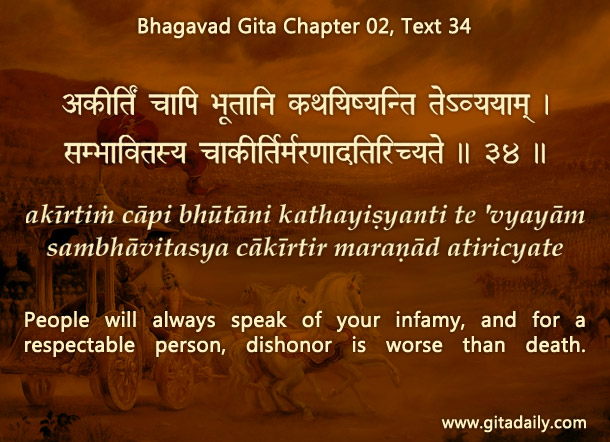The Bhagavad-gita (02.34) declares that for respectable people, dishonor is worse than death. This verse raises the question: is dishonor really more painful than death?
Sounding a seemingly contrary note, the Gita itself lists the major miseries of material existence: birth, old age, disease and death (13.09). The relevant point is that the Gita lists death, but not dishonor, as one of life’s major miseries. Why, then, does this verse declare dishonor to be worse than death?
The answer lies in the context indicated by the word sambhavitasya: “for the respectable” or “for those who have been honored.” In terms of general principles, death is undoubtedly one of life’s most fearful, painful and devastating experiences. In terms of personal experience, however, how much an event hurts a person depends on what they consider valuable. And we often make decisions based not just on general principles, but also on our personal evaluations: which choice will benefit us the most or cost us the least.
When Arjuna was confronted with the prospect of fighting a fratricidal war, the cost of engaging in that war was evident to him — that impelled him to retreat from the fight. But he overlooked the cost of such withdrawal. He had been universally celebrated as a fearless warrior, and if he withdrew from the war, he would be derided as a coward (01.35-36). Given his specific reputation, that pejorative label would hurt him unbearably.
To forcefully remind Arjuna of the cost of retreating and to thereby inspire him to stick to his duty, this verse rhetorically declares that dishonor is worse than death.
One-sentence summary:
Which event hurts a person how much depends on their values — when guiding others to make good decisions based on a sound cost-benefit analysis, don’t just list general principles; highlight the factors that address their specific contexts.
Think it over:
- Why does the Gita list death as one of life’s major miseries?
- Why does the Gita state that dishonor is worse than death?
- To guide others, what factors do we need to consider?
***
02.34: People will always speak of your infamy, and for a respectable person, dishonor is worse than death.
To know more about this verse, please click on the image


Leave A Comment